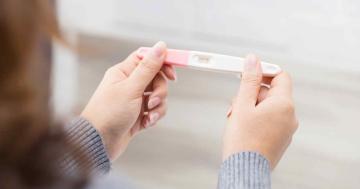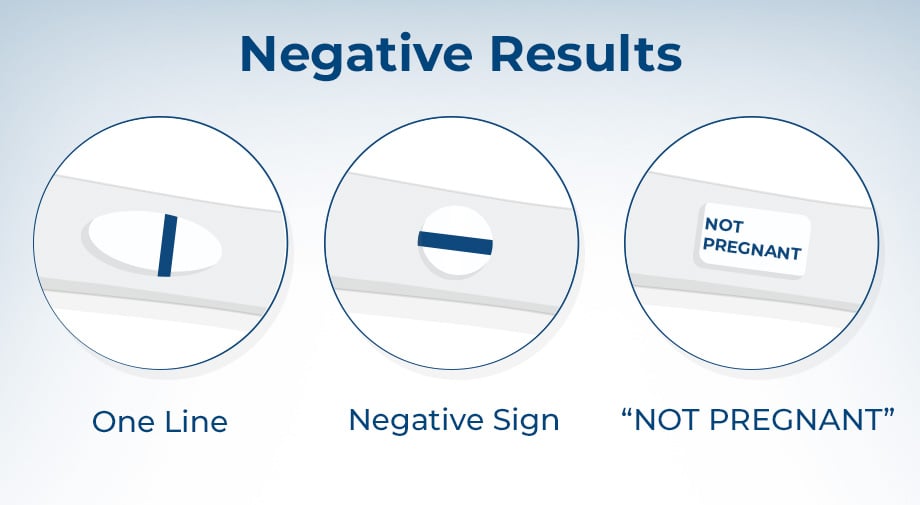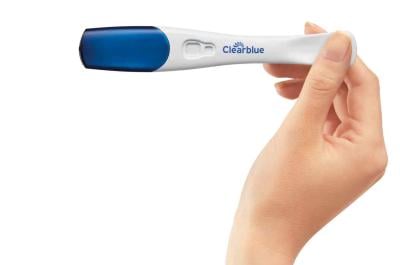
When you miss your period, you may be wondering ‘Am I pregnant?’ Perhaps you’re feeling a little nauseous, your breasts are tender, or you’re experiencing other early signs of pregnancy, but you’ve taken the test, and the results say you’re not pregnant. You may be asking: Can I trust the results? Sometimes you can get a false negative on your pregnancy test – meaning you’re pregnant, but the test says otherwise. On the flipside, you can miss your period, but you’re not pregnant. Read on to find out what a negative pregnancy test result means.
In this article
- Why did I get a negative test result?
- Is it possible to be pregnant and get a negative pregnancy test result?
- What is happening when my pregnancy test is negative, and I missed my period?
- When is it too early to test?
- Do I have to take the test first thing in the morning?
- Can I do the test wrong?
- What if there is something wrong with the test?
- I got a negative result, what should I do next?
- A pregnancy test works by detecting the hCG hormone, which is usually only present in your body if you’re pregnant.
- Your hCG levels will increase over time if you are pregnant.
- A negative pregnancy test result means the test hasn’t detected hCG in your urine.
- If your period is very late, or you’ve skipped your period, and you get a negative result, you are unlikely to be pregnant.
- If you are testing before the date of your expected period, you may be pregnant but your hCG levels are too low for the test to detect.
- You may get a negative result when testing early if you’re not using the first urine of the day, you drank too much liquid, or the test is not sensitive enough for early testing – even if you’re pregnant.
Why did I get a negative test result?
You can get a negative result on your pregnancy test for two reasons: You are not pregnant or you are pregnant, but you tested too early for the pregnancy test you used to pick up the hCG ‘pregnancy’ hormone in your body.
Pregnancy tests work by picking up (detecting) a hormone known as hCG (human Chorionic Gonadotrophin), which is produced when you get pregnant and will continue to increase over the first couple of months of pregnancy. You can see how hCG levels increase from ovulation to your missed period in the graph below.
Rise of pregnancy hormone
(hCG) in early pregnancy
concentration
period
period
Adapted from: Gnoth C. and Johnson S. Strips of Hope: Accuracy of Home Pregnancy Tests and New Developments. GeburtshilfeFrauenheilkd 2014;74(7):661–669.
If you test too early, a test may not pick up enough hCG to turn positive. If you’re testing before the day of your expected period, you may see a negative result – even if you’re pregnant – if:
- Your test wasn’t sensitive enough for early testing.
- You didn’t use the first urine of the day, so concentration of hCG in your urine wasn’t high enough.
- You drank too much liquid before testing and you diluted the hormone in your urine.
But what if you got a negative result, and your period is late? Chances are you are not pregnant and your period may be late or you may even skip it due to stress or illness. If the test is negative and you didn’t test early, you may have missed your period if:
- You’re breastfeeding
- You’ve been ill
- You have irregular periods (e.g., due to Polycystic Ovarian Syndrome, often called PCOS)
- You’ve been travelling
- You’ve not been sleeping properly
- You’ve been under very high stress
- You’re on fertility medication like Clomid®
- You haven’t had a period for months
- You’re menopausal or peri-menopausal
See your doctor for further advice if you’re worried about a missed or skipped period.
Is it possible to be pregnant and get a negative pregnancy test result?
Yes, it is possible. Getting a negative result doesn’t mean you’re not pregnant, it may just mean your hCG levels are not high enough for the test to detect the hormone in your urine. Even the most sensitive, ‘early detection’, pregnancy tests available can only detect pregnancy up to six days before your missed period (which is five days before you expect your period) and even then, these tests won’t be able to detect every pregnancy that early.
Also, if you’re testing very early, your test may only detect hCG in your urine in the morning when it’s most concentrated. This is also why it’s important not to drink too much water before using a home pregnancy test, as this can dilute your hCG levels as well.
Other reasons you may get a negative result on a test when you’re pregnant could be because you’re using a test that has expired (check the packaging for the date) or has not been stored properly (you need to keep your test between 2-30°C).
There is also the incredibly rare chance you have an ectopic pregnancy that doesn’t give a positive result– fewer than 3% of ectopic pregnancies show a negative result.
If you get a negative test result and you think you are still pregnant – take another test on the day you expect your period. If your period is overdue, test again three days later. If you are still unsure, see your doctor.
What is happening when my pregnancy test is negative, and I missed my period?
It’s easy to jump to the conclusion a missed period means pregnancy, but sometimes your period is late for other reasons. To start with, your menstrual cycle length can vary between cycles and, in fact, 46% of cycles can vary by seven days or more. Your period can be very late or you may even skip your period due to:
- illness
- travel
- poor sleep
- very high stress
You may also experience irregular periods after you’ve had a baby and you’re breastfeeding. If you’ve recently given birth and are breastfeeding, your periods may not start again until you’ve stopped breastfeeding – but that doesn’t mean that you can’t get pregnant so don’t forget to use contraception if that’s not in your plan!
Another reason you may have irregular or absent periods is you’re entering menopause. But even if you’re over 45 and you’ve noticed your period is late, it’s still a good idea to take a pregnancy test just in case.
Birth control pills can also affect the regularity of your periods when you come off them. This is because hormonal contraceptives actually control your menstrual cycles while you’re taking them so you may be irregular for the first couple of months as your body ‘recalibrates’.
If you haven’t had a period for months and you’re not pregnant, this could be due to an imbalance in your hormone levels, a side effect from medication, excessive exercise, or being severely over or underweight. If you haven’t had your period for months, see your doctor to find out the cause.
When is it too early to test?
It depends on the test. Some tests are sensitive enough to detect hCG in your urine six days before your missed period (which is five days before you expect your period). Read the instructions on the pack to understand what the brand of test you’re using means by early detection. Some women still prefer to test on the day they expect their period, when all home pregnancy tests claim to be over 99% accurate.
Conception usually happens around two weeks before your period would normally be expected. If you’re trying for a baby you can use an ovulation test not only to know your peak fertile days, but it will inform you about your cycle, so you know when it’s best to take the test. This can help you feel more confident in the results you see.
Do I have to take the test first thing in the morning?
Not unless you are testing early. Otherwise your test should detect hCG any time of day if you are pregnant. However, if you’re taking a pregnancy test before your missed period, it’s better to test first thing in the morning when concentrations of hCG are the highest.
You can also dilute the amount of hCG in your urine by drinking too much liquid, so try not to drink more than you usually would.
Can I do the test wrong?
It’s important you read the instructions that come with your test carefully and follow them. This way you can be sure you can trust the result. Some tests are easier to read than others – for a test that gives a result in words such as ‘pregnant’ or ‘not pregnant’, is clear – whereas visual tests where you have to interpret lines can be harder to read and can leave you wondering whether you’re pregnant or not. If you doubt you’re reading the result correctly and the uncertainty makes you feel anxious, then get a test that is easy to read, like Clearblue Digital, so you can be sure of the result you see.
You can see what a negative pregnancy test result looks like in our infographic below.

What if there is something wrong with the test?
You can get a false negative with a pregnancy test that has passed its expiry date, so check the packaging before use.
I got a negative result, what should I do next?
If you’re still not sure about the result, you wait until the day of your expected period to test, or test again in three days’ time if you’ve missed your period, with a pregnancy test from a reliable brand and follow the instructions carefully. You can also go to your doctor if you have doubts. You may get tested at the clinic or your doctor may recommend another brand of test to use.



